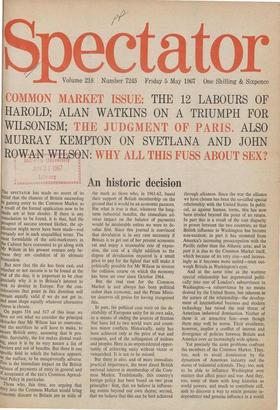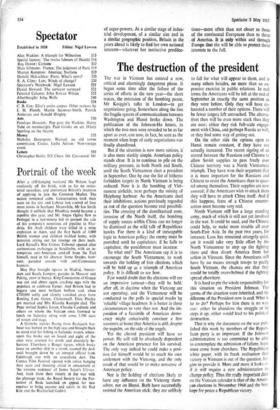An historic decision
The SPECTATOR has made no secret of its elief that the chances of Britain succeeding in gaining entry to the Common Market as a result of the formal application now to be ade are at best slender. If there is any nsolation to be found, it is that, had the ospect of success seemed likelier, the ap- hcation might never have been made—and rtainly not in such unqualified terms. The most formidable of the anti-marketeers in the Cabinet have consented to go along with Mr Wilson in his present venture only be- cause they are confident of its ultimate frustration.
But now that the die has been cast, and Whether or not success is to be found at the end of the day, it is important to be clear Precisely why it is in Britain's interest to seek its destiny in Europe. For the con- siderations that point in this direction will remain equally valid if we do not get in, and must shape equally whatever alternative Course is chosen.
On pages 516 and 517 of this issue we have set out what we consider the principal Obstacles that Mr Wilson has to overcome, and the sacrifices he will have to make, to secure British entry, assuming that is pos- sible. Inevitably, the list makes dismal read- ing, since it is by its very nature a list of barriers and not of benefits. But there is one 4Pecific field in which the balance appears, On the surface, to be unequivocally adverse. This is the immediate impact on the British balance of payments of entry in general and acceptance of the EEc's Common Agricul- tural Policy in particular. Those who, this time, are arguing that ttry into the Common Market would bring conoinic disaster to Britain are as wide of the mark as those who, in 1961-62, based their support of British membership on the ground that it would be an economic panacea. But what is true is that, whatever the long- term industrial benefits, the immediate ad- verse impact on the balance of payments would be intolerable unless we were to de- value first. Since this journal is convinced that devalution is in any case necessary if Britain is to get out of her present economic rut and enjoy a reasonable rate of expan- sion, the cost of a slight addition to the degree of devaluation required is a small price to pay for the figleaf that will make it politically possible for Mr Wilson to reverse the collision course on which the economy has been set ever since October 1964.
But the real case for the Common Market is and always has been political rather than economic, and the Prime Minis- ter deserves all praise for having recognised this.
In part, the political case rests on the de- sirability of European unity for its own sake, as a means of ending the sources of friction that have led to two world wars and count- less minor conflicts. Historically, unity has been achieved only at the price of war and conquest, and of the subjugation of nations and peoples. Here is an unprecedented oppor- tunity of achieving unity without victor or vanquished. It is not to be missed.
But there is also, and of more immediate practical importance, the most direct British national interest in membership of the Com- mon Market. Traditionally, this country's foreign policy has been based on two great principles: first, that we believe in influenc- ing events beyond our own shores; second, that we believe that this can be best achieved through alliances. Since the war the alliance we have chosen has been the so-called special relationship with the United States. In politi- cal, as against human, terms, this has now been eroded beyond the point of no return. In part this is a result of the vast disparity in power between the two countries, so that British influence in Washington has become non-existent; in part it has stemmed from America's increasing preoccupation with the Pacific rather than the Atlantic area; and in part it is due to the Common Market itself, which because of its very size—and increas- ingly as it becomes more united—must out- weigh Britain in Washington's eyes.
And at the same time as the wartime special relationship has degenerated politi- cally into one of London's subservience to Washington—a subservience by no means desired by the United States, but inherent in the nature of the relationship—the develop- ment of international business and modern technology has raised the real threat of American industrial domination. Neither of these is an attractive fate—even though there may well be worse. Their avoidance, however, implies a conflict of interest and divergence of policies between Britain and America over an increasingly wide sphere.
Yet precisely the same problems confront the members of the Common Market. They, too, seek to avoid domination by the dynamism of American industry and the status of industrial colonials. They, too, seek to be able to influence Washington over matters that affect peace and war. And they, too, some of them with long histories as world powers, and much to contribute still, seek to discover a way to retain genuine in- dependence and genuine influence in a world of super-powers. At a similar stage of indus- trial development, of a similar size and in a similar geographic position, Britain in the years ahead is likely to find her own national interests—whatever her instinctive predilec- tions—more often than not closer to those of the continental Europeans than to those Of America. It is only within and through Europe that she will be able to protect those interests to the full.



































